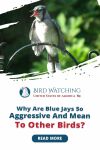
What’s This Post About?
It’s fun to watch how ducklings follow their mother duck in a queue wherever it goes. But have you tried picking one up? Or have you in any way threatened the baby duckling, triggering the mommy duck to bite you?
Ducks are one of the various birds that people love to pet. You hear their quacks in your backyard, the joyful flapping of their wings in the water, and watch the baby ducks follow their mommy duck everywhere it goes. But, what you perhaps hear more than that is that ducks are quite aggressive and may even bite you if they feel alarmed.
How true is this?
Ducks may be all quacky and fun to have in your backyard but they might show signs of aggression or may appear territorial if triggered. They usually don’t bite, but if the situation demands, chances are that they might bite you.

Common Behaviours that Backyard Ducks Display
Ducks are quite complicated when it comes to social mingling. They may look cute and friendly but may also shock you with some traits that may make you think that ducks are antisocial.
To understand some of the common behaviors that backyard ducks display, continue to read below.
1. Following You Wherever You Go

Baby ducks are known for imprinting on whoever they see in the early hours of their lives. If a duck is hatching eggs, then young hatchlings tend to move along with their mother, following wherever it goes.
If the eggs were rather incubated by you, then just know that you have a constant follower that will require your attention endlessly. This might be problematic if you go out for work or studies. Ducks tend to feel sad when they don’t have anyone to be around, so they will definitely feel it if you are not.
Imprinting on who or what they see is a common behavior that we notice in the ducks during their early stages of life. So if you see a baby duckling following you or imprinting on you, then it is because they are displaying their common behavior.
did you know?
Baby ducks area ready to evacuate their nest within hours after they are hatched.
2. Being With the Squad
Ducks usually do not like to roam around all alone. They tend to feel lonely and sad if there is no one to play with them. Ducks find it joyful to play in pairs, or there is a whole squad playing and quacking in the backyard. However, this isn’t the case with male ducks. They rather like it secluded.

Female ducks love to play in pairs. They will enjoy sharing the pond with a fellow female duck. They find it joyous to play in pairs or groups. However, the much territorial male, drake, will not like to share its territory with another male. Male ducks are more territorial than their female counterparts
As a common trait, you will find female ducks hanging around in pairs, playing and quacking cheerfully in the water with their fellows. They are pretty friendly among their squad and will enjoy having to share the pond. But, the case slightly differs among male ducks.
3. Biting to Express Affection

Ducks would want you to show affection to them. Their constant need for attention needs to be fulfilled, or else you will have a sad duck roaming about your backyard.
They may have traits that make them appear antisocial, but ducks look for constant attention too. So if you get a regular short bite from your duck, then that means you are not giving them attention.
It is better to have ducks in pairs. One of their common behaviors is that they seek constant displays of affection. If you are an outgoing person, then you better have a pair of ducks, or else you will end up depressing your duck.
4. Flirting with Their Mates
Not many of us knew about this common behavior of the ducks. Both males and females tend to show some change in their behavior when they are eager to mate. They communicate their willingness through the movement of their neck and feathers.

Male duck or drake will show elevated aggression while having a raised tail to show its flirting skills. As a response, females tend to bob their necks up and down to express acceptance.
Both female and male ducks tend to flirt with their mates during their mating season. They communicate that they’re flirting through the raised feathers of their tail, constant movement of their neck, back and forth by the males, and bobbing of the neck by the females as a response.
fun fact
A female duck bobs its head in response to a male duck trying to flirt with it to express its acceptance.
Are Ducks Aggressive?
Yes, but not always!
Ducks are pretty complicated when it comes to socializing. They may not always be as frank and cute as they may appear. In addition, both male and female ducks will exhibit traits that may make you believe that they are antisocial.

As a matter of fact, ducklings and female ducks are less likely to be aggressive, while male ducks may exhibit traits of being aggressive and dominant. Of course, females tend to be aggressive too, but only if they are triggered. Otherwise, they are quite fun to pet.
Male ducks tend to be more aggressive than females. They are aggressive because they either want to express their dominance or to attract their mate. Females tend to be less aggressive and are rather friendly. Ducks are not aggressive throughout but frequently show their aggression when triggered.
When Do Ducks Show Signs of Being Territorial?

You will notice traits of being territorial and dominant in male ducks more than you might see in a female duck. Male ducks, a.k.a drakes, are more territorial and aggressive than females. They tend to bite out of their aggression to drive away anyone or anything that tries to invade their personal space.
Drakes, or male ducks, are highly territorial. They do not appreciate any animal or human invading their territory. Therefore, Drakes are likely to feel threatened when another male duck tries to be more domineering or means any harm to their mating partner. This is an alarming situation for all male ducks.
Drakes will bite to drive away another male duck if it tries to threaten their mating partner or attempts to invade their personal space. They will not only bite other birds and animals but also humans if they are alarmed. So, to avoid being bitten, you better not appear a threat to a drake’s territory.
PRO-TIP
Use feed as a measure to make drake your friend and ensure that you do no such thing that make make your appear as a threat within or to its territory.
To know more about whether ducks like humans or not, read this interesting post .
Do Ducks Like Humans? Do They Show Emotions Or Affection?
Ducks are moody birds; however, they can be very friendly and playful if in a good mood. Keep reading to learn more about ducks.
What Triggers Ducks To Bite?

Ducks may not usually bite you out of aggression or territoriality, they may also do it when they want you to show some attention towards them. Nonetheless, there are some alarming situations when they feel triggered to bite you out of aggression.
1. When They Are Hungry
We, as humans, tend to lose our calm sometimes when we are hungry. Ducks are birds. They tend to show more aggressive behavior when they are overwhelmed with hunger.
So, if you get a sharp pinch on your elbow, then you probably didn’t feed your duck this afternoon.
2. When A Mommy Duck Feels a Threat to Her Eggs

Do not try to get any closer to the eggs of a duck when it is around. Well, even if it is not around, why would you want to go near them since those eggs are quite delicate. Mommy duck does not approve of anyone going near her hatchlings.
Normally, other birds and animals prey on eggs. This is a great threat to the hatchlings. This is one of the various reasons why a female duck would not approve of anyone attempting to come closer.
did you know?
A duck sleeps with half its brain awake. This enables it to sense the presence of a predator in no time.
3. When You or a Bird Tries To Invade Their Territory

Usually, it is the male duck, drake, that is territorial and tends to be more aggressive than female ducks. Females love when there is another female around them. They will be playing and roaming around joyfully. It is only when a male duck intervenes, that all the things start to get messy.
Drakes are highly territorial. They will bite another duck or bird to chase it away. We are also at a threat of being bitten if the male duck feels we are not accommodating enough and are a threat to its territory. In such circumstances, you may trigger a drake to bite you when all you would be doing is feed him.
WARNING!
Back off immediately when you see your duck hissing at you. Leave it alone for a while to calm down.
4. To Attract Their Mates

We have by now established the fact that drakes are more aggressive than female ducks are. Apart from being territorial, drakes show their aggression when it is time for mating. They will bite female ducks to attract them and even pull out their feathers to express their aggression.
You will find drakes not only territorial and aggressive to avoid invasion and to protect their mates but also to attract female ducks as a sign of attraction and their willingness to mate with them.
fun fact
If you want to know when ducks are likely to breed, notice an elevation in drake's aggression. If a drake is being extra elicited, it is trying to express its alacrity to mate.
Do Ducks Show Any Signs Before They Bite?

Usually, it comes abruptly to get your attention instantly. Nevertheless, they may give you warnings in cases where they want to alert you of something. They may show signs such as hissing at you, raising or flapping their wings to signal you that something is coming your way.
Drakes are quite domineering. They tend to stretch and raise their body in such a way that they look bigger than their usual size. In addition, they will flap their wings to communicate their aggression to a threat, whether it’s another bird or animal, or humans. Females may hiss at you and flap their wings too before they attempt to munch on you.
Ducks may often bite you to show affection or when they want your attention. Drakes will lengthen their body to express their dominance and flap their wings as an indication that you are about to get bitten. Females are less aggressive and tend to hiss when they are about to munch on your skin.
Should You See A Doctor If You Get Bitten By a Duck?

When a duck bites you, it is either a sharp pinch, a brief grip, or a strong pull, depending on what triggered a duck to bite you. The severity is based on the mood in which the duck bit you.
If it is a brief grip of the bill on your skin, then this could be a sign of wanting attention. If you feel a quick-sharp pinch, then the bird is trying to give you a warning.
Watch your action to ensure that you are not doing something alarming to the bird. The most alarming is when it is a firm grab followed by a strong pull. This kind of bite you get when the duck is really in a bad mood.
You only tend to get a bruise or a bit of swelling when the bill of the duck gets the hold of your skin. It isn’t usually severe, which means that you don’t have to see a doctor unless your skin cuts open — which is quite rare. Clean the wound with an antiseptic and see a doctor only if the wound is quite unusual.
PRO-TIP
Apply a perfume spray from a distance on the wound as it contains a spirit that helps to avoid infections.
WARNING!
Immediately see a doctor if you notice that your wound is unusual.
Keep Reading!
Ducks are quite common as backyard birds. The sound of them flapping their wings and quaking in your backyard all day long is fun unless you misinterpret some important and alarming signs that they try to communicate non - verbally.
Ducks cannot speak. They communicate with each other, other birds, and humans through their body language. If you learn to understand their non-verbals then the chances are that you have developed a better relationship with your pet.
Ducks will bite you when they are triggered. This can be a warning, a sign indicating their hunger, or a way of showing affection towards their mates or the one they belong to. They may appear to be aggressive and territorial, but such behaviors are only momentary.
Just like ducks, sparrows are also thought to be aggressive and territorial. If you want to explore more, then you may want to read this interesting post .
Are Sparrows an Aggressive or Territorial Bird Species?
House sparrows may look small but they become aggressive when dealing with intruders. Keep reading to find out more about their nature.

By David A. Swanson
Bird Watching USA
My name is David and I'm the the founder of Bird Watching USA! I started Bird Watching with My father-in-law many years ago, and I've become an addict to watching these beautiful creatures. I've learnt so much over about bird watching over the years that I want to share with the world everything I know about them!

David A. Swanson
Bird Watching USA
My name is David and I'm the the founder of Bird Watching USA! I started Bird Watching with My father-in-law many years ago, and I've become an addict to watching these beautiful creatures. I've learnt so much over about bird watching over the years that I want to share with the world everything I know about them!









